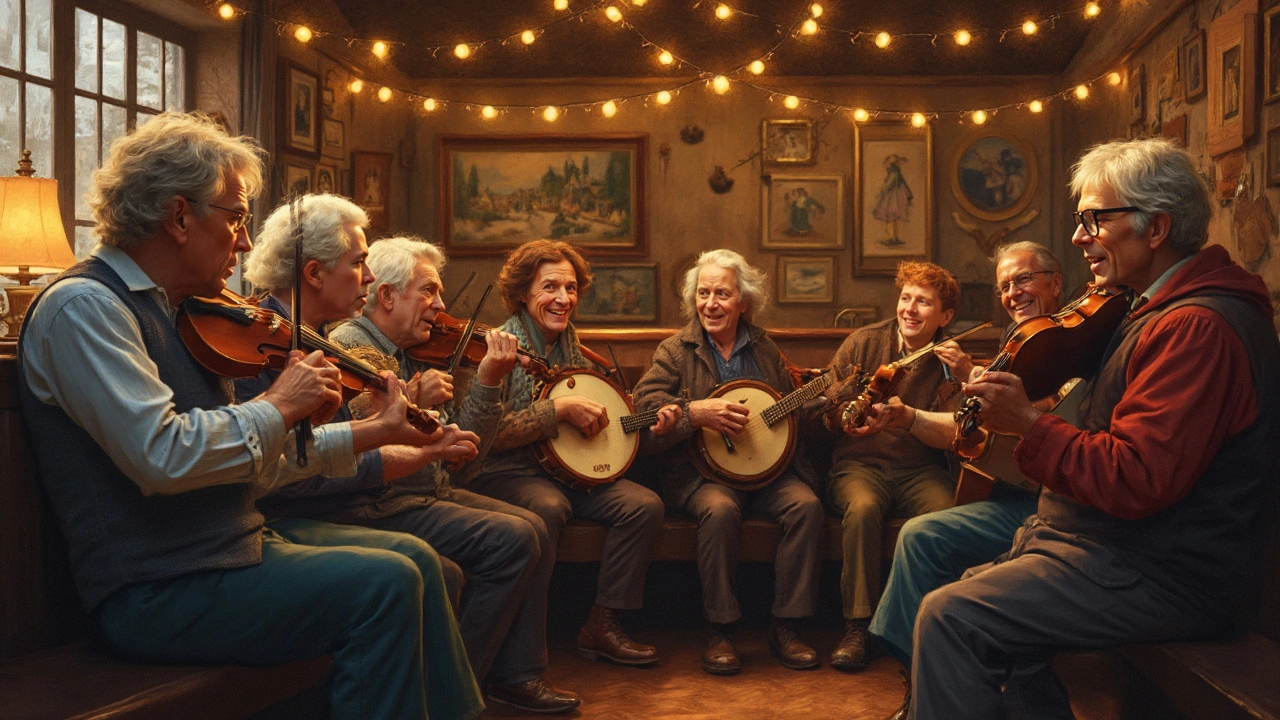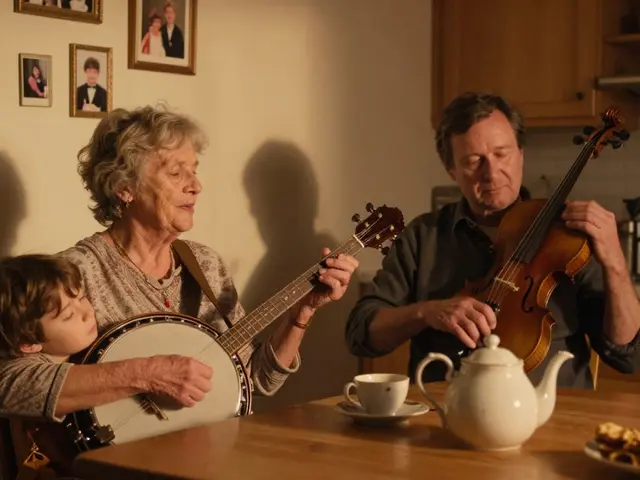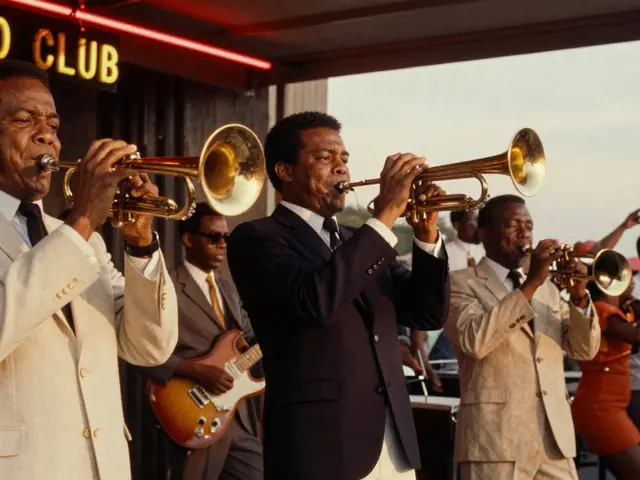Ever had that experience where a song hits you right in the feels? Folk music is one of those genres that can do just that—and there's more to it than just catchy tunes. It's got this incredible knack for healing and connecting us with our deepest emotions.
Think of a simple guitar strum or a familiar fiddle tune. These sounds aren't just music; they're like a warm hug that wraps around you when you need it most. It's no wonder why people are diving into folk music as a form of therapy.
But what's the magic behind it? For starters, folk music has this unique ability to tell stories, stories that have been passed down through generations. These tales resonate with personal experiences, letting you feel understood even when you’re at your loneliest.
There's something raw and authentic about folk music. It doesn’t hide behind fancy production; instead, it lays emotions bare. This honesty is what makes it such a therapeutic ally. It's all about self-expression and letting your spirit sing.
- Introduction to Folk Music and Healing
- Emotional Benefits of Folk Music
- Building Community Through Music
- Expressive Storytelling and Catharsis
- Integrating Folk Music into Daily Life
Introduction to Folk Music and Healing
When we talk about folk music, we’re not just referring to tunes from the past. It’s a living tradition that keeps evolving, telling stories of people, places, and experiences. This genre has a unique charm that goes beyond entertainment—it's an integral part of cultural identity and emotional expression.
So, what’s the deal with folk music being a therapeutic tool? Well, it’s not just a theory. Folk music has been linked with mental health and emotional well-being for quite some time. Its rhythmic simplicity and relatable narratives make it accessible to anyone, from kids to elders.
Why Folk Music Soothes the Soul
One reason folk music heals is its ability to resonate with personal experiences. The themes often revolve around everyday life, such as love, loss, and triumph. These universal stories make it easy for listeners to relate and find comfort in the lyrics.
Folk music also encourages participation. Whether it's singing along at a campfire or tapping your foot to a live performance, this active involvement can lift your mood and ease feelings of loneliness. Participatory elements can create a sense of community, bringing people together regardless of their background.
A Track Record of Healing
It's not just anecdotal evidence, though. Research suggests that music therapy, including folk tunes, can reduce anxiety and depression symptoms. A study by the Journal of Music Therapy found significant mood improvements in people who engaged with folk-based interventions.
Modern Applications
Today, therapists are tuning into the healing power of folk music, integrating it into sessions to help clients express themselves. It’s a fantastic way for individuals to open up and share their feelings without having to verbalize them directly.
The simplicity of folk music—its melodies and lyrics—makes it a perfect tool for focused listening, which can enhance mindfulness practices. Just like a good conversation, a sound tune can provide that pause from daily chaos.
So next time life gets overwhelming, consider turning to folk music. It just might provide the solace you need.
Emotional Benefits of Folk Music
Feeling overwhelmed or down lately? Give folk music a shot as your go-to mood booster. One of the amazing things about it is its ability to reach right into your heart and ease those heavy feelings. Thanks to its storytelling nature, folk music resonates with personal experiences, making listeners feel understood and connected.
The Power of Storytelling
At the core of folk music lies its storytelling aspect. Songs often recount tales of love, struggle, and triumph, allowing you to see yourself in these universal experiences. This empathic connection can have a calming effect, offering solace and reassurance. Remember Bob Dylan's songs or Joni Mitchell's tales? They're great examples of how stories in music can transport you and change your perspective on life.
Creating Connection
Ever sung 'This Land is Your Land' in a group? It’s more than just singing; it's a shared moment that builds community. By engaging with folk music, you tap into a collective cultural memory, feeling not just understood but also part of a larger whole. This sense of belonging can be therapeutic, especially during tough times.
Scientific Insights
There’s more than just anecdotal evidence backing this up. Studies suggest that music, including folk music, can lower stress hormones like cortisol. When paired with its capacity to trigger memory and emotion, it becomes a potent tool for dealing with anxiety and depression.
Personal Expression
Whether you're strumming a guitar yourself or just enjoying a tune, folk music encourages personal expression. Got some emotions bottled up? Letting them out through music, even if it's just singing along, can help process those feelings.
All these factors make folk music a natural choice for emotional healing. It's not just about listening; it's about feeling connected, both to yourself and the world around you. So next time you need an emotional pick-me-up, put on some folk tunes and let the music work its magic.

Building Community Through Music
Ever sang along with a group around a campfire or at a local pub? That's folk music working its magic, bringing folks together. This sense of community is one of the most potent aspects of folk music. It's not just about the tunes but the shared experience.
There’s an undeniable power in joining voices with others. Research shows that singing in a group can actually synchronize heartbeats. How wild is that? This phenomenon, studied by the University of Gothenburg, suggests that singing in harmony could foster a sense of unity and belonging.
The famous folk singer Pete Seeger once said, "Participation—that's what's gonna save the human race." His words highlight how engaging with music can strengthen community bonds.
Strong communities aren’t just about numbers; they're about connections. In towns across the world, people gather at folk festivals, local music clubs, and cultural events to both listen and participate. These gatherings are melting pots for cultural exchange and creativity, giving folk music its timeless appeal.
The Role of Folk Festivals
Folk festivals are more than just music events—they're celebrations of culture and heritage. Here, musicians and enthusiasts come together to share stories and traditions. This isn’t just about entertainment but preserving and passing down valuable cultural knowledge.
A great example is the annual Newport Folk Festival, renowned for its enduring celebration of musical diversity and community spirit. It provides a platform for both veteran and emerging artists to connect with audiences, creating an atmosphere of collective enjoyment and learning.
Joining Local Music Circles
You don't need to travel far to experience community through music. Look around your neighborhood for music clubs or jam sessions. Plenty of communities host meetups where musicians of all skill levels come together to play, learn, and share.
Want to dive in? Here are some tips:
- Check community boards or social media groups for local jam sessions or open mic nights.
- Don't be shy—bring along an instrument or just your voice! Folk music thrives on participation.
- Support local musicians by attending their gigs and buying their music.
Embrace the spirited, inclusive nature of folk music. It’s all about shared stories, collective experiences, and coming together. You might just find your own folk family!
Expressive Storytelling and Catharsis
Expressive storytelling is one of the big reasons why folk music strikes such a chord—pun totally intended! These songs are filled with tales about real people’s struggles, loves, and dreams. It's like a musical history lesson that gives us a glimpse into lives we might never experience otherwise.
Now, why is this storytelling so therapeutic? Well, it turns out that when we listen to stories, especially ones set to music, our brains release oxytocin. This is the same hormone that's released when we bond with someone, which explains that feel-good vibe you get from a good folk tune.
The Cathartic Effect
Catharsis is this amazing experience of releasing pent-up emotions. Through folk songs, we can shed the weight of feelings we've held onto for too long. It's like having a good cry after watching a touching movie—it's cleansing. You express your vulnerabilities and find strength in them. In folk music, this often happens in the form of both joyful and sorrowful ballads.
Take Woody Guthrie’s songs, for instance. He wrote about the Dust Bowl and the Great Depression, capturing the struggles of everyday folks. Singing along with these songs lets you empathize with those hardships while feeling a little lighter afterward. It's music therapy without the couch!
Storytelling as a Form of Therapy
This approach is gaining traction in therapeutic circles, where storytelling through music helps with emotional release. Whether you’re playing these songs, singing them, or just listening, you’re creating a space to express and explore those emotions.
- Listening: Find a song that resonates with your current mood, whether you're feeling down, nostalgic, or elated.
- Writing: Try writing your own folk song. Think of a story you want to tell and let the words flow.
- Performing: Join community events where you can perform or share these songs; it’s a great way to connect with others.
So, next time life gets overwhelming, try immersing yourself in a folk song. Let its story and melody guide you to a place of release and renewal.

Integrating Folk Music into Daily Life
Bringing folk music into your daily routine doesn’t mean you have to play the banjo at every family gathering—though that might be fun! It’s about finding simple ways to let the music and its benefits fit into your life.
Morning Rituals
Start your day with a little folk magic. Setting your morning alarm to a gentle folk tune can bring some sunshine to your mornings. It might make waking up easier and set a positive tone for the day.
Work and Study
Need some focus during work or study sessions? Instrumental folk music is a fantastic background choice. It’s known to help with concentration without being too distracting. Just think light guitar melodies working their way into your productivity zone.
Evening Wind Down
As the day winds down, let folk music help you relax. Create a mellow playlist for dinner or before bed. The calming nature of these tunes can help ease stress and prepare you for a restful night.
Family and Community
Folk music shines when it brings people together. Try organizing a small gathering with friends or family featuring a folk music playlist. Everyone can share their favorite songs, bringing back memories or introducing new favorites.
Learn to Play
Want to get a bit more hands-on? Learning a simple folk instrument like the ukulele or harmonica can be both fun and rewarding. You don't need to be Mozart; just strumming along can be a great stress reliever.
Fun Fact
Studies suggest that listening to upbeat music, including folk tunes, can boost your mood up to 10%. That's definitely worth a listen!
Embracing folk music doesn't demand big changes—it's all about the little moments. With its down-to-earth vibe, it’s a perfect companion for life's various rhythms.






